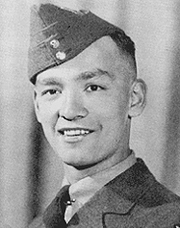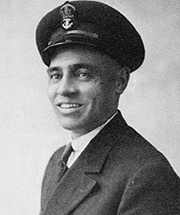Outstanding Accomplishments – Branching Out
As in the First World War, most Indigenous people served in the infantry, primarily because it required the most manpower. As well, the other branches of military service—the new Royal Canadian Air Force (RCAF) and the growing Royal Canadian Navy (RCN)—had entrance restrictions, such as educational requirements or a preference for candidates whose ancestors were British. One military historian explains that:
. . . when war broke out there was also an air force regulation barring those from commissions who were not of "pure European descent." This was repealed quite early in the war. The Royal Canadian Navy had a more sweeping regulation. Among its prerequisites for service in any rank was a condition that an applicant "be a British born subject, of a white Race." Although it was not until February 1943 that this regulation was officially rescinded, a few Canadian Indians and Métis voluntarily joined and were accepted in both services from the outbreak of war.62
Not surprisingly, the 1942-43 report of the Indian Affairs Branch listed only 29 First Nations members in the air services and nine in the RCN, although these numbers grew by war's end. One of these men, Flying Officer Willard John Bolduc, an Ojibwa from Chapleau, Ontario, earned the Distinguished Flying Cross (DFC) for his performance as an air gunner during a series of bombing attacks in 1943.
While, once again, many Indigenous soldiers became known for their sniping and scouting skills, other talents were demonstrated in this war. They were assuming more varied and demanding duties.

Jack Beaver of Ontario's Alderville Band was overseas with the RCAF for 13 months during the war. A member of the Force's 126 Wing, he served in England, Holland, Belgium, and France. After the war, Beaver, a member of the Mississauga First Nation, was chief of the band for four years and eventually became President of the Churchill Falls (Labrador) Corporation.
(Marjorie Beaver)

Nelson Shead of Selkirk, Manitoba, served as a Chief Motor Mechanic with the Royal Canadian Naval Reserve. His two brothers, Bill and Harry also joined the navy. All three of the Shead brothers, whose origins trace to the Fish River First Nation band, had worked aboard fishing vessels on Lake Winnipeg before the war. (William Shead)
- Date modified: